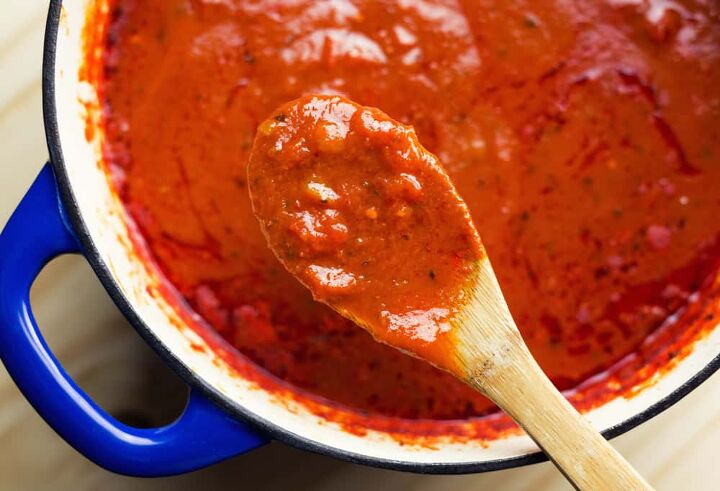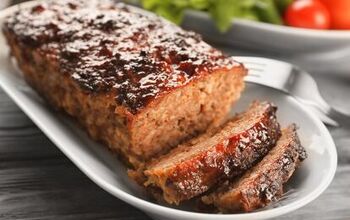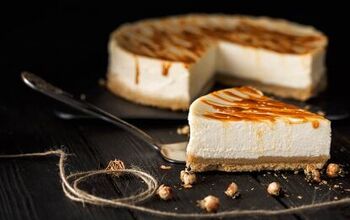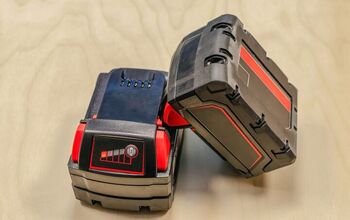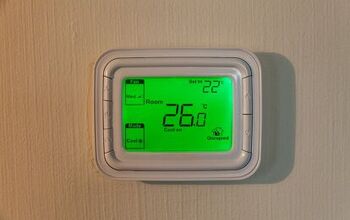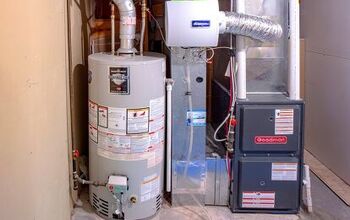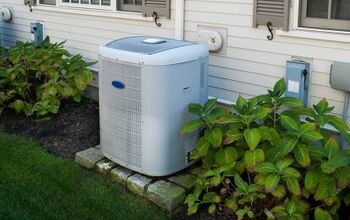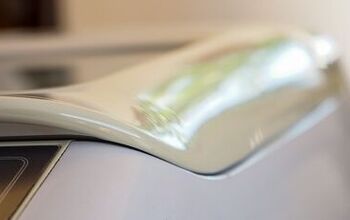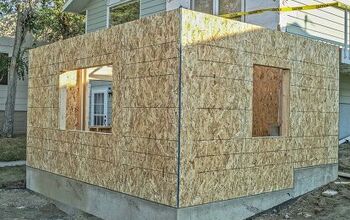How Long Does Pasta Sauce Last In The Fridge?

As a New Jersey citizen, I have learned to take pasta sauce seriously. There are few things that are as upsetting as Italian gravy that’s gone bad, especially in the fridge. If you are like me and have a fondness for some good sauce, you’re wondering how long you can keep it in the fridge before it goes bad. As it turns out, the answer might surprise you…
Store-bought pasta sauce can last for 5-6 days in the fridge if it doesn’t contain many preservatives. The homemade, cooked sauce can last as long as 9 days if you cover it properly. Make sure to check for mold if the pasta sauce has been in the fridge for over 1 week.
Some pasta sauces have a much longer shelf life and fridge life than others, and it’s good to know how long you can stretch that sauce for. This guide will help you learn about what you can do to keep your sauce fresh and delicious for as long as possible.
Preservatives And Pasta Sauce
One of the biggest aspects you will need to take into account is the use of preservatives in pasta sauce. Preservatives have the ability to stretch the lifespan of refrigerated sauce for as long as 14 days in some cases. However, the vast majority of pasta sauce companies do not employ the use of preservatives in their sauce making.
With that being said, there are some pasta sauce brands that famously use preservatives and unique cooking methods to extend the life of their sauces. The most popular sauce brands that do this include:
- Prego can be left in the jar, in the fridge for up to two weeks. It even says so on the package.
- Bertolli’s pasta sauce is good for up to 10 days. They’re pretty liberal about their guidelines, though, so it’s best to take this with a grain of salt.
- Newman’s Own Spaghetti Sauce lasts for as long as seven days after being in the fridge. This sauce has no hardcore preservatives, just a lot of staying power.
- If you don’t know when your sauce will be best by after refrigerating, you can always refer to the label. The labels give you a general guideline when it comes to quality. Food safety-wise, you can expect your sauce to be good for at least one more day.
How Long Can You Use Refrigerated Pasta Sauce Served Cold?
While a lot of Italian-Americans might take offense to even suggesting such a thing, it’s important to note that pasta sauce has different expiration dates based on whether you serve it hot or cold. This is because the heat can kill bacteria that have grown in the sauce. If you serve your pasta sauce cold like I do, you usually should use refrigerated pasta sauce within five days.
How Long Can You Use Refrigerated Pasta Sauce Served Warm?
When it comes to serving your pasta sauce hot or warm, the heat from the stovetop will kill off a lot of the bacteria that could potentially cause food poisoning. If you heat up your pasta sauce to the point of bubbling, you can use them up to nine or 10 days, assuming no mold growth has started.
How Long Does Homemade Pasta Sauce Last In The Fridge?
If you make your own sauce, then it can be hard to judge how long your sauce will be able to last in the fridge. The general gist is that you should only expect to be able to use your pasta sauce for three to five days after it’s been properly stored in the fridge. Some people go a little longer and wait until the sauce smells strange or grows mold, but that’s generally not advisable.
How Long Do Creamy Pasta Sauces Last In The Fridge?
Love a good alfredo sauce? Well, the dairy can impact your overall shelf life. Cheese and alfredo sauce added to tomato sauce can drastically cut the shelf life due to the risk of bacteria growth. Alfredo sauce can be eaten between four and five days after refrigeration.
If you have a cheesy pasta sauce, it should be eaten fairly quickly after you’ve opened up that jar. Usually, two days is the maximum it can stay good. The closer the sauce’s pH level is to a neutral seven, the more likely it is that your pasta sauce’s shelf life is going to shorten out.
How Can You Extend The Life Of Your Pasta Sauce?
You should never cry over spilled ragu, or at the very least, pasta sauce you don’t want to use within its allotted fridge time. Thankfully, there are ways to make your favorite sauce last for a while longer. These tips will help you out:
- Add lemon juice. Lemon juice is high in citric acid, a preservative that will help you naturally extend the life of your sauce. It also adds a little tart kick to both store-bought and homemade sauce.
- Freeze it. The freezer life of pasta sauce is a minimum of three months, which makes it one of the best ways to make sure you don’t have to lose out on “Italian gravy” anytime soon. With that said, it’s possible to enjoy pasta sauce that’s been frozen for as long as six to eight months.
- Keep it super cold. Sauce that’s kept at 0 degrees Fahrenheit will keep indefinitely, unlike sauce that is frozen at 22 degrees or higher.
- Don’t leave it out at room temperature for more than two hours. Once sauce hits the two-hour limit, it will have too much bacteria to be salvageable.
How Much Time Do You Have To Refrigerate Pasta Sauce?
If you make your own pasta sauce, then you already know that it’s easy to just leave it on the counter and forget about it. But, you shouldn’t. Pasta sauce should be refrigerated within two hours of making it. If you intend on freezing it, place it in the fridge first, then scoop your sauce into a plastic baggie or container to transfer it to the freezer later on.
How Can You Tell If Pasta Sauce Has Gone Bad?
Though rare, there are moments where pasta sauce’s lifespan just gets cut short for one minute or another. Sometimes, it’s not even that issue as much as it is that you don’t know if you left it around for too long. If you aren’t sure whether or not your sauce has gone bad, check for the following signs:
- You notice that there’s mold there. This is the most commonly-cited way people decide that pasta sauce has gone off. Any time there’s mold growth, your pasta sauce is gone. Toss it.
- The sauce has started to change color. If you notice it turning whiter (without it being frozen) or darker, it probably has too much mold to be safe to eat. If it’s turning darker, then it’s generally not good to eat.
- The expiration date passed. If the pasta sauce’s expiration date has passed on, you probably should throw the sauce out even if you haven’t opened it. Even if it’s not necessarily rotten, the quality of the sauce’s flavor will usually suffer.
- You can smell the pasta sauce and it doesn’t smell good. Pasta sauce gone bad will have a sour, almost musty smell. Sometimes, it may also have a smell that resembles rotten eggs due to the increase in sulfides.
- If you taste it, the sauce’s flavor might be distorted. I do not advocate a taste test unless you’ve tried every other method of telling if a sauce went bad without issue. However, if it tastes bad, it’s safe to say that it probably is bad. If it suddenly tastes bland, then it’s on the verge of going bad but hasn’t totally expired yet.
Related Questions
How long can cooked pasta stay good for if it’s left in the fridge?
If you just cooked a delicious spaghetti dinner and have some leftovers, then you don’t have to worry about having to eat it all in one day. You can keep cooked pasta in the fridge for three days safely, as long as the sauce is not overly cheesy. Though it can stay longer in the freezer, most frozen pastas lose their texture and are prone to freezer burn. Therefore, freezing is not recommended.
Is pasta a food poisoning risk?
Believe it or not, both pasta and rice are considered to be food poisoning risks. Cooked pasta is at risk of toxins released by bacillus cereus. This is bacteria that releases a heat-resistant toxin that can cause stomach illnesses as well as digestive upset. This is why pasta should be eaten within two to three days if it’s been cooked.
Do meat, mushrooms, or other ingredients impact tomato sauces’ shelf life?
Aside from cheese, most other ingredients will not pose a problem with commercially-made pasta sauces. The ingredients in commercial pasta sauce have already been sanitized and cooked in a manner that will not render them dangerous for consumption. Even with homemade pasta, you should be safe simply because the acidity level of the sauce should kill off most pathogens.

Ossiana Tepfenhart is an expert writer, focusing on interior design and general home tips. Writing is her life, and it's what she does best. Her interests include art and real estate investments.
More by Ossiana Tepfenhart



